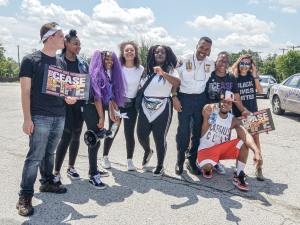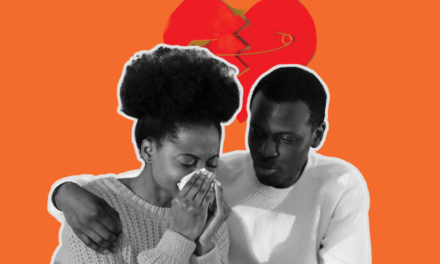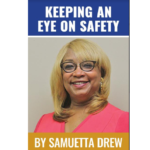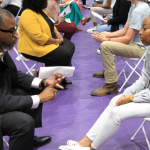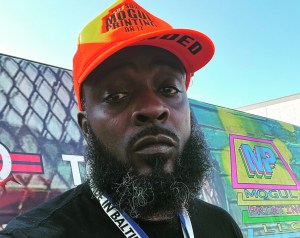By Chief Melvin Russell,
via Persuasion.Community
I grew up in Baltimore, where Black neighborhoods were filled with extended families watching over one another especially the children. No one in the neighborhood bore any burdens alone. Whether it was hunger, childcare issues, rent, transportation- or repairs, the extended family was always there to fill the need. We called it “The Village.”
The wonderful thing about The Village was that it consisted of neighborhood residents, faith-based organizations, the corner mom-and-pop stores, teachers from the local schools, place of worship and local police officers. I remember once walking home from one of our weekend BB gun battles in the woods. Less than a block from home, I was stopped by an officer with my Daisy pump BB rifle tightly wrapped in a trash bag. The police asked me what I was carrying, and I told him. He said I should take it straight home. The officer was pleasant and treated me like he was an elder in my neighborhood concerned about my well-being. He was part of my neighborhood village, too.
It was this positive relationship with the police that encouraged me to become an officer.
In 1979, I joined the Baltimore Police Department (BPD) and in 1981 I became the first African-American to graduate class valedictorian from the BPD Academy. I went on to have a career which comprised seven years of patrol and twenty years in undercover narcotics enforcement, before becoming a district commander and retiring in 2019 as Chief of the Community Division and the acting deputy commissioner of administration. As such, I believe I bring a unique perspective to the matter of effective and honorable policing in America, and the many challenges policing faces.

First, let’s discuss the history. In the 1960s, the civil rights movement changed government, education, sports, entertainment, housing, and law enforcement. Black people began to see improvements in their socio-economic status. As doors started to open, more Black residents entered into law enforcement across the country.
By 1967, Lucius Amerson became the nation’s first Black Sheriff (of Macon County, Ala.). In 1984, Benjamin Ward was appointed the first Black police commissioner of New York City. Black officers were finally moving up in rank and sitting at the table to help shape how policing should look, especially in poor Black and Brown communities. Impoverished areas finally had representation within a system that for too many years was abusive and dismissive.
Make no mistake: unfair racial practices still existed, limiting Blacks in leadership roles. Obstacles and racism were always looming against the Black officer. But we also started seeing initiatives and programs materialize that benefited disadvantaged Black and Brown communities: initiatives like Officer Friendly, Police Athletic League Centers, D.A.R.E. (Drug Abuse Resistance Education), Community Police Officers, and Block Watchers.
These initiatives helped to hold the police accountable and keep them engaged with the communities they swore to protect and serve. As a result, police officers became less abusive in the Black communities they served. It certainly was better than the days of Birmingham Public Safety Commissioner Theophilus Eugene “Bull” Connor and his barbaric and brutal policing practices during the Civil Rights era.
The result was that from the 1970s to the early 90s, communities in many impoverished Black neighborhoods became more like The Village. There was a healthy daily dose of an engaged presence (by both the community and police) which reduced crime while netting huge relational equity between the community and police. Everyone had a better opportunity to flourish and live safely.
Then things began to change. In the mid-1990s, as I was engrossed in dismantling drug organizations, an upcoming Baltimore politician traveled to New York to study their CompStat Program, which uses data to identify and target problematic locations throughout the city. This same politician also learned of a successful New York model called “zero tolerance,” which helped decrease crime in N.Y. exponentially. By 1999, this politician had won the Baltimore Mayoral election and shortly after made good on his campaign promise of bringing both a data-driven approach and zero tolerance policy to Baltimore City.
The latter would be absolutely disastrous.
Zero tolerance swept through communities of color, and hundreds of thousands of residents were arrested. In Baltimore City, many of those arrests were based on illegal policing practices, and at least one-third were thrown out by the state’s attorney office, or even sooner by court commissioners.
These practices, along with the new technology of the internet, disconnected us from each other on a face-to-face level. Relationships began to erode between all community members, and most certainly between law enforcement officers and the communities they were supposed to protect and serve. Trust dissipated, and compassion and empathy were diminishing rapidly.
The changes went so deep that they removed the human side of policing and replaced it totally with algorithms, data and predictive policing. Having that police instinct- the gut-burning hunch or personal knowledge of behavior patterns from local residents- was no longer part of the equation.
Today, policing has gotten so entrenched in this modern attitude that it has forgotten how to build and grow relationships with all community residents- from the neighborhood businesses and faith-based organizations to the local school administration and its students. By chasing the latest technical ways of modernizing policing, claiming it’s pushing us further into the 21st century, we are hurting, abusing, neglecting and leaving the most important element out of the equation: the community.
All the leaders and officers that had the former institutional knowledge and spoke a language that was woven with love, compassion, respect, and integrity have now mostly faded away or been pushed out. Even those few who were fortunate enough to be exposed to a different way of policing find themselves trapped in the current system, a culture that cares not to be transformed.
As a result, I strongly believe today’s average police officer does not understand the root cause of unfavorable views on policing. The vast majority of officers are being reared in a totally different kind of police culture than those in my era. Officers of the law have a duty to protect and serve. However, all the emphasis placed on “Protection” has left little room for its balancing partner, “Serve.” The result is a type of policing that is heavy handed and way out of balance.
This became clear to me at the start of 2007, when I finally awoke from my “Rip Van Winkle” state of blindness regarding what had happened in our communities over the past 20 years. Back in uniform patrol as a Lieutenant Shift Commander, I will never forget one of the first times I parked my cruiser in a populated neighborhood and began just walking through the streets to connect and engage the residents.
Within my first stroll through half of the block a group of teenagers deliberately crossed the street so as to not walk past me on the same sidewalk, yelling “I hate the ****** police!” As I walked through the neighborhood, most residents were standoffish, and displayed a disdainful look as I passed along friendly salutations.
I was shocked at how community and police relationships had eroded. I became determined to bring back the glory days of The Village.
There are six fundamental pillars of any great police department: 1) Building trust through community policing; 2) effective crime reduction strategies; 3) transparency in policy and oversight; 4) effective technology and social media; 5) current officer training and education; and 6) officer safety and wellness.
All of these must be heavily interwoven with integrity, accountability, and openness to community collaboration. Police departments must develop a robust and active engagement section that will relentlessly work towards re-engaging all parts of the community.
Leadership is the key to achieving this. Ryan Holiday said, “Where the head goes, the body will follow,” and this holds true for policing. Too many current top cops only step forth to own up to wrongdoings within their agencies when the “stuff” hits the fan and even then they come forward too late, with some lukewarm apology. These are reactionary leaders. What we need are officers that will stop “stuff” from happening when it first begins to rear its ugly head, not after lives have been lost and the agency tries to strategize how to best navigate the damage caused by negligence.
These are transformational leaders: the long-term, proactive thinkers.
Today, instead of seeking transformational leadership, a lot of people still talk about “defunding the police” as the solution to our problems. This has taken on a few meanings. I’ve heard arguments for wiping out the entire police department or forming some type of policing arm made up of people with a varying degree of professional backgrounds. There have also been calls to slash police budgets drastically and redirect those funds into community youth, mental wellness, job and drug programs.
To be very clear, I get the negative sentiments out there about the police. In many ways, law enforcement has brought this unfavorable light on ourselves. Few officers (certainly not enough) had ample foresight to see that the bridge between police and community was being eroded.
Nevertheless, defunding vital resources is not the way to rebuild trust. To our Black youth, I say: If you truly feel that the institution of policing is acting egregiously towards Black communities, I urge you to consider becoming part of policing, and join in the real struggle to change it from the inside out. Many of you would find that you are desperately needed in law enforcement. This is how we achieve reform: by putting transformational leaders atop the nation’s 18,000 police agencies, and adding new blood that hasn’t been corrupted by the present-day culture of policing.
Today’s officers must also do their part. They should pause for a moment and remember the qualities of better policing during yesteryear, when budgets included tons of community outreach initiatives. Defunding is not the answer as much as reallocating some of the inflated unaccountable police budgets, where line items easily mask massive waste.
Sir Robert Peel, considered to be the father of policing, said the following: “The police are the public and the public are the police; the police being only members of the public who are paid to give full-time attention to duties which are incumbent on every citizen in the interests of community welfare and existence.”
Those who are employed in policing must remember that they are community members first, just as those in our communities must step up and work to transform the culture of policing from within. By learning from the past and from each other, we can begin to build a future where all members of the community are served with dignity and respect.
Help us Continue to tell OUR Story and join the AFRO family as a member – subscribers are now members! Join here!
The post BPD Chief Implores Black Youth: To Reform the Police, Join It appeared first on AFRO American Newspapers .

